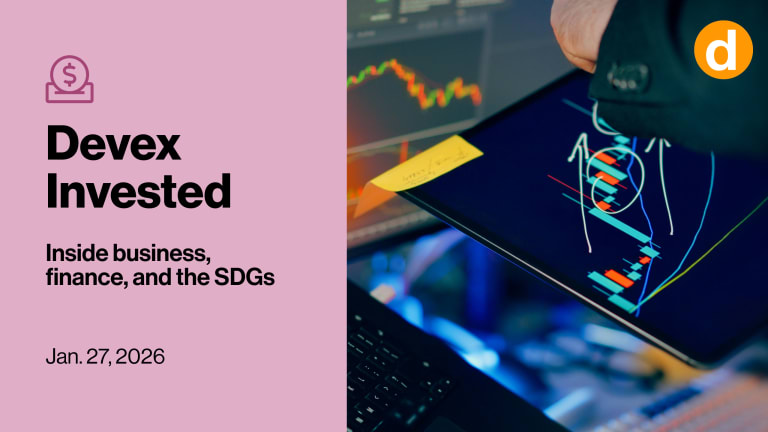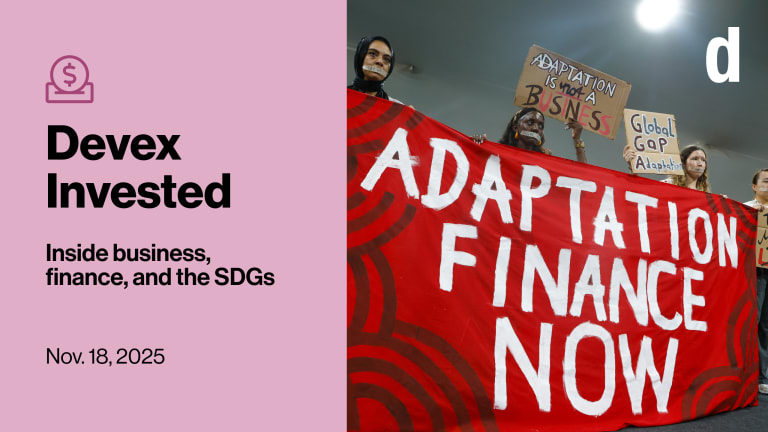
With the 27th United Nations Climate Change Conference, or COP 27, just around the corner, everyone is rushing to make news with climate announcements.
This is a preview of Devex Invested
Sign up to this weekly newsletter inside business, finance, and the SDGs, in your inbox every Tuesday.
High-income nations’ pledge to deliver $100 billion in annual climate finance is still unfulfilled, of course. But there was some hope in a $1 billion announcement to fund the clean energy transition in South Africa and Indonesia from the generally low-profile Climate Investments Fund, or CIF. Each nation will get $500 million. The South Africa piece is part of a larger $8.5 billion deal unveiled at COP 26 by European nations and the United States with an aim to shut down coal-fired power plants.
I sat down with CIF chief Mafalda Duarte in Washington last week to ask her about the path forward.
• First, Duarte stressed that the $500 million for South Africa will be leveraged, to the tune of $2.1 billion — but even that is not enough. “Everyone understands more will be needed,” she told me. South Africa estimates north of $60 billion will be required before the end of the decade to fund the transition.
• Duarte explained CIF financing like this: “Our capital is risk capital. We provide long grace periods, long maturities, terms of capital that are even more concessional than multilateral development banks themselves.” The fund’s goal is to be catalytic, bringing in private capital and even money from development finance institutions.
• CIF’s loans are also supporting upskilling workers and investments in the green industry, so that people will have jobs once the plants are shuttered.
• “We are demonstrating how to do this, because we have not had a decommissioning of plants in these countries before,” Duarte said, describing this stage as a “blueprint” for the future.
• Duarte intentionally led her organization into a pickle: Indonesia still has coal plants coming online. “We wanted to go to the most difficult places,” she said. India, which is majorly dependent on coal and set to take over the Group of 20 major economies’ leadership after Indonesia, is also on her radar.
• Her outlook for COP 27? “Finance is going to be a very tricky issue and top of the agenda.” But will there be a major breakthrough? “It’s difficult to see.”
Read more: South Africa, Indonesia get $1B from Climate Investment Funds
+ For more climate change news, check out our Road to COP 27 series.
Banking on change
The Asian Development Bank is undergoing a massive overhaul. As Devex first reported Sunday, the bank is streamlining its lending to be more agile and responsive to clients. All five of its regional departments will act as a single financing facility — or “window,” to use industry parlance. Moreover, sovereign and nonsovereign lending will go through the same window, as ADB seeks to spur private sector development. It also wants to be a leading climate finance player.
“The battle against climate change will be won or lost in Asia and the Pacific,” staffers tell the bank’s board of directors.
ADB Managing Director General Woochong Um tells me via email that the reforms in part stem from the COVID-19 economic fallout. “The development agenda is also more complex, with a greater emphasis on issues that require regional or global action,” he adds.
If all this sounds familiar, it’s because U.S. Treasury Secretary Janet Yellen recently called for such reforms.
Read: Asian Development Bank undertakes major overhaul to streamline lending
(Re)gaining momentum
ICYMI, last week Devex hosted our annual Future of Development Finance event in London, with a crowd eager to learn how the COVID-19 pandemic and war in Ukraine have changed the game — and where we go from here, with a recession possibly looming.
“It's a bad moment for development finance," Open Society Foundations President Mark Malloch-Brown said at the event. “We've both got to restore the political will and make people realize that these problems are shared problems.”
Emerging market debt is back on the agenda in a serious way. The sensible thing to do is to tackle the issue now, said Heidi Chow, executive director of campaigning organization Debt Justice. And the key is involving the private sector, she added.
From the event: The pandemic readiness fund is short on cash. It’s not the only issue (Pro)
+ Not yet a Pro member? Unlock the piece by starting your 15-day free trial now.
+ And you can watch the full Devex Invested: The future of development finance event via YouTube here.
Into a blender
Pulling this all together: Private capital for blended finance climate deals has dried up significantly, dropping by more than 60% in the last three years compared to the previous three-year period, according to a new report from Convergence.
Your next job?
Director of Finance
The Nature Conservancy
$100,000-$130,000 (annual gross salary)
United States
Between 2019-2021, $14 billion went to blended climate deals, a sharp drop from $36.5 billion in the previous period. And the outlook is not super optimistic, as Russia’s war in Ukraine and other macro forces pull capital in other directions.
Also, only 14% of climate deals have a pure adaptation focus. Private sector investments have long complained they lack “bankable” adaptation projects. Why?
“What we’re hearing from the private sector is adaptation is a very difficult proposition because, number one, in emerging markets, you're dealing with a highly elevated risk level and perceived risk level. … And number two, the pipeline and deals, you're looking at smaller deals in comparison to mitigation and energy conservation,” Nnamdi Igbokwe, a senior Convergence team member and an expert on global capital markets, tells me.
Igbokwe says the public sector, philanthropies, and the private sector need to be more collaborative if they want to really move money in.
Read more: Blended finance for climate fell 60% despite calls for more funds (Pro)
What we’re reading
Has Mark Carney lost his authority over a private sector green initiative? Some think so. [Wall Street Journal]
China-based Asian Infrastructure Investment Bank ramps up development lending — will it take on the World Bank? [Financial Times]
Climate finance is a catch-22 in fragile states. [Devex Pro]
Q&A: Kenya's Equity Bank CEO on sustainability, green finance, and COP 27. [Devex Pro]









